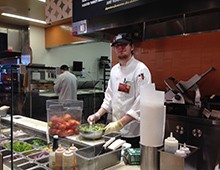Cronkite News has moved to a new home at cronkitenews.azpbs.org. Use this site to search archives from 2011 to May 2015. You can search the new site for current stories.
Whole Foods CEO discusses move into low-income communities
Whole Foods Market Inc. officials said they want to bring healthier food options to everyone by serving communities with limited access to healthy and fresh-food options.
They have opened stores in lower-income neighborhoods in Chicago, Detroit, New Orleans and Newark, New Jersey.
But does the Austin-based company plan to do the same in Arizona, where food deserts - geographic areas where access to affordable, healthy food options is limited or nonexistent – abound?
Co-Chief Executive Officer Walter Robb didn’t specifically address Arizona during a recent talk at an Economic Club of Phoenix speaker series event in Scottsdale.
A Whole Foods spokeswoman wrote in an e-mail that the company recognizes the need for fresh food options in low-income areas in this region, which includes Arizona, Southern California, Southern Nevada and Hawaii. However, Marci Frumkin said the company is focusing its efforts on its existing stores in economically depressed areas.
Maricopa County, Arizona’s largest county, has 85 food deserts, according to the U.S. Department of Agriculture.
Vince Breneman of the USDA said these lower-income communities could benefit from a store opening there.
The government defined a food desert as a census tract with a substantial share of low-income residents who don’t have ready access to a grocery store or healthy, affordable food retail outlet.
The absence of food options contributes to a poor diet and can lead to higher levels of obesity and other diet-related diseases, according to the USDA.
Diane Cereantes, who lives in a Phoenix food desert near Broadway Road and Seventh Street, said she struggles to find food variety.
“There are some close small stores, but not with a lot of healthy foods,” said Cereantes, who picked up soda and snack at a Circle K near 16th Street and Broadway Road on Wednesday afternoon.
Cereantes said she’s never shopped at a Whole Foods before, so she had no opinion on whether she’d like one in the area.
The chain, known for more upscale offerings and natural and organic foods, has 11 stores in Arizona.
When the store opened in Chicago, skeptics questioned whether the store could survive because other grocers offered lower prices, according to the Washington Post.
But Whole Foods lowered prices in these communities but still kept quality standards high, Robb said in his e-mail.
“We’re making a genuine effort to make a positive contribution in new communities and around the world,” Robb said in his email.
During his recent talk, Robb said the company now has the confidence to reach for bigger goals and giving back to the community is one of its top priorities.
The company recently posted a record $3.3 billion in sales, a 9- percent increase over the prior year, according to the company’s fourth quarter figures released in November. It also opened 13 new stores and expanded into seven new markets last year.
Beyond helping residents eat better, the store also helps the economy. For example, the Detroit store created 135 jobs, Robb said.
Robb said he hopes to duplicate the effort in other locations. In addition to bringing jobs to Detroit, Whole Foods opened the Let’s Talk Food Nutrition and Education Center, which offers free healthy eating classes to residents.
Robb said in his e-mail that Whole Foods is “much more than a grocery store to our shoppers — we are a community partner, a neighborhood gathering place and a trusted resource for nutrition and health.”








